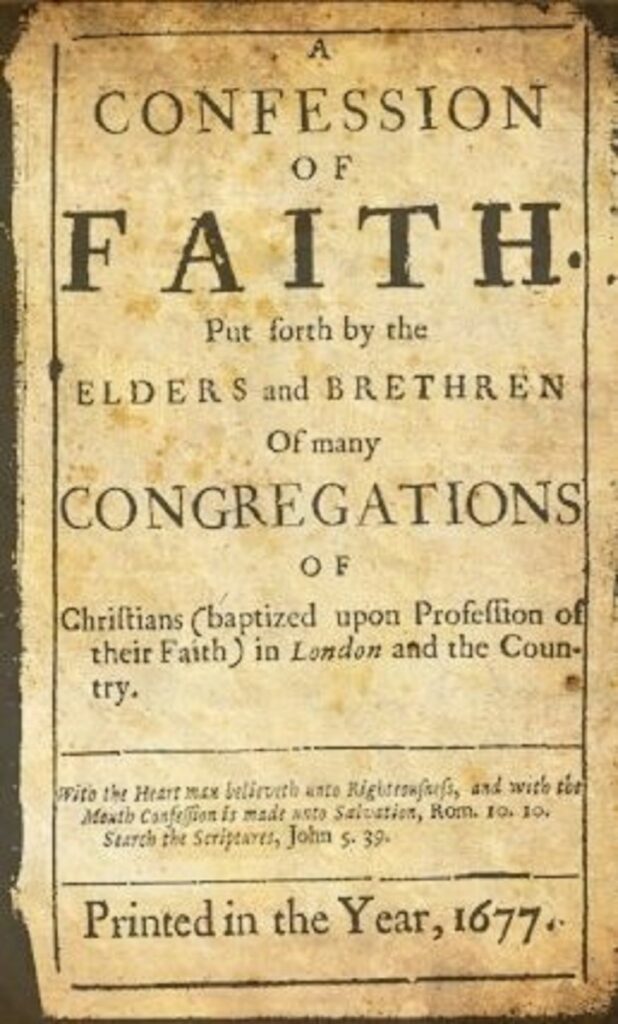The 1689 London Baptist Confession of Faith

Grace Fellowship Church holds to the 1689 London Baptist Confession of Faith as a faithful summary of our convictions under the supreme and regulating authority of Scripture alone.
Our pulpit ministry reflects the theology of this Confession although the focus of our preaching is the Word of God in the Bible. Elders subscribe to the Confession as a general representation of their beliefs whereas members are not required to be in full agreement with it since we are a diverse body of believers who are in the process of learning and growing together as we discern “the mind of Christ” in the Scriptures (1 Cor. 2:16). We recognize that our Confession is a non-inspired document written by fallible humans, and whereas it is an excellent summary of the major doctrines of Scripture, the consciences of believers must be bound by the authority of the Word of God alone.
We strive to interact with the broader body of Christ charitably in Christian love and do not weaponize our Confession as a wedge to divide or a banner for war. We abhor sectarianism and seek to mortify spiritual pride as a despicable evil. We believe in the communion of saints according to Scripture’s teaching concerning the universal church (John 10:16; 17:20–23; 1 Cor. 12:12–31; Eph. 1:22–23; 4:4–6; 5:25–28; Col. 2:19; 1 Tim. 3:15; Heb. 12:22–24). Browse or download the full confession below for yourself!
View or save the PDF by clicking here
The 1689 Baptist Confession builds on theological developments of the early church (e.g., Apostles’ Creed, Nicene Creed, Chalcedonian Christology, etc.), was born out of the fires of persecution, and stems from the Reformation movement in Europe. It reflects the biblical and Reformed teaching of the Particular Baptists of England, men like John Bunyan, Nehemiah Coxe, William Kiffin, and Benjamin Keach, who stood on the shoulders of Reformers such as Ulrich Zwingli, John Calvin, Henrich Bullinger, Martin Bucer, William Perkins, William Ames, and the Puritans. More modern subscribers included the likes of John Gill, Andrew Fuller, William Carey, and Charles Haddon Spurgeon. Its theology reflects the gist of the Reformed confessions, including the Canons of Dort, although its ecclesiology and sacramentology is distinctively Baptistic.
We hold to a robust biblical and Reformed view of the doctrine of God, including classical Trinitarian theism, the sovereignty of God, and the glory of God as the chief end of all things. We preach the Doctrines of Grace (radical depravity, sovereign election, particular redemption, effectual calling, perseverance of the saints) and uphold the Five Solas of the Reformation (salvation is according to Scripture alone, by grace alone, through faith alone, in Christ alone, to the glory of God alone). We also believe that the gospel must be preached as a bona fide and universal offer that calls all people to repent and believe in Jesus Christ for salvation from sin, death, and Hell. We believe in the perpetuity of the moral law of God summarized in the Ten Commandments and hold that the gospel is the only way of salvation. Our understanding of the redemptive-historical structure of Scripture is covenantal, similar to what Nehemiah Coxe sets forth in his famous Discourse on the Covenants.
We deny Pelagianism in all its forms as well as Arminianism, which is nothing but a softened yet more sophisticated regurgitation of Pelagius’s old errors. In church worship, we hold to the regulative principle which states that all the elements of worship must be warranted by the Word and thus have divine authorization for their legitimization. Hence we pray the Scriptures, preach the Scriptures, sing the Scriptures, observe the sacraments according to the Scriptures, and fellowship around the Scriptures. Our ordinary method of preaching is the consecutive and sequential exposition of Bible books so that we may proclaim “the whole counsel of God” and follow the excellent pattern of the ancient church (Acts 2:42; 20:27).

Spurgeon said of the 1689:
“This ancient document is the most excellent epitome of the things most surely believed among us. By the preserving hand of the Triune Jehovah we have been kept faithful to the great points of our glorious gospel, and we feel more resolved perpetually to abide by them. This little volume is not issued as an authoritative rule, or code of faith, whereby ye are to be fettered, but as an assistance to you in controversy, a confirmation in faith, and the means of edification and righteousness. Here the younger members of our church will have a body of divinity in small compass, and by means of the scriptural proofs, will be ready to give a reason for the hope that is in them. Be not ashamed of your faith; remember it is the ancient Gospel of martyrs, confessors, reformers, and saints. Above all, it is the truth of God against which the Gates of hell cannot prevail. Let your lives adorn your faith, let your example recommend your creed. Above all, live in Christ Jesus, and walk in him, giving credence to no teaching but that which is manifestly approved of Him, and owned by the Holy Spirit. Cleave fast to the Word of God, which is here mapped out to you.”
—From Spurgeon’s Forward in the 1855 reprint of the Baptist Confession
Learn More…